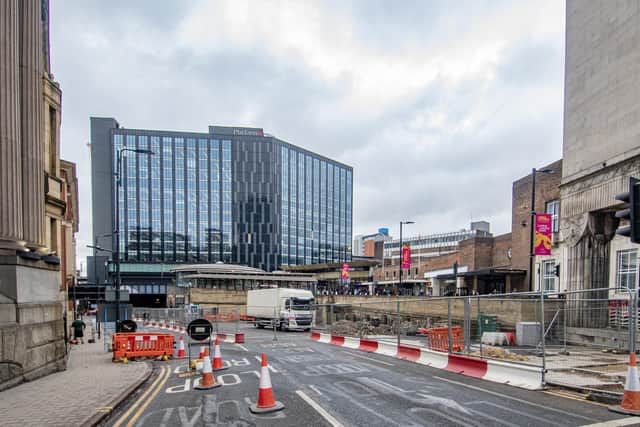It is the Government’s business to find the money for West Yorkshire’s mass-transit system - Andrew Vine
When the drawer clanged shut on a report outlining radical change, it was consigned to oblivion, usually because it was too expensive to action, or ministers did not regard it as a political priority.
That civil servant’s words popped into my mind last week when the National Infrastructure Commission outlined how Britain should build for the future, which had some thought-provoking assessments of what our region needs to prosper.
Advertisement
Hide AdAdvertisement
Hide AdIn particular, the report identified Leeds needing massive investment in public transport, which alongside similar schemes in Birmingham, Manchester and Bristol, carried a total price tag of £22bn.


I could hear the filing cabinet drawer clanging shut before reading to the end of the sentence.
The chances of Yorkshire getting that sort of money from the Government are precisely zero, even though the NIC supposedly informs ministerial thinking.
With a general election probably a year away, and the Chancellor telling fellow finance ministers at an international gathering that the nation’s books are in a terrible state and that matters are likely to get worse before getting better, the NIC’s conclusions are bound for the administrative graveyard, however vigorously our region’s advocates both in and outside Parliament attempt to resurrect them.
Advertisement
Hide AdAdvertisement
Hide AdThe NIC is undoubtedly right. Leeds is being held back by inadequate public transport, but then the same can be said for every other Yorkshire city, with the possible exception of Sheffield, which has at least got its Supertram.
As if to underline what a dire state our public transport is in, hard on the heels of the NIC report came the announcement from the Government-run TransPennine Express that 20 trains a day are being cut from December.
This is hardly the improvement promised to what was arguably the worst rail service in Britain when it was taken back into public ownership in May.
The statement about fewer trains improving reliability is the sort of mealy-mouthed nonsense we grew weary of hearing from failing rail operators.
Advertisement
Hide AdAdvertisement
Hide AdThey must take us for fools. Long-suffering passengers know real improvements would mean faster and more frequent services, on which it’s possible to get a seat, not fewer trains.
Taken together, the NIC report and the latest inadequacies of TPE amount – presumably unintentionally – to an official acknowledgement of how badly served our region has been over investment in critical infrastructure upon which economic progress depends.
That’s as depressing as it is infuriating. Equally annoying is the high-handed presumption by the NIC that if we’re to get the public transport we need, we’ll have to find the money to pay for it ourselves, with the commission advocating road-charging in Leeds.
We’ve already had a bellyful of this attitude. When the announcement of a mass-transit system for West Yorkshire was first made, the shine was taken off it by the rider that the area’s residents would have to foot the bulk of the bill.
Advertisement
Hide AdAdvertisement
Hide AdThis sort of policy-making just isn’t good enough. It’s unfair and implies that the failings of the transport network are somehow our own fault because we haven’t put enough money in.
It is the Government’s business to find the money to keep one of Britain’s biggest cities moving. All of us who run a car are only too aware we already pay through the nose via road tax and fuel duty for the basic necessity of driving. Use some of that money to make improvements.
And there is another sly get-out clause for the Government in the NIC report, when it says it is up to local leaders to decide transport priorities.
Yes, they undoubtedly know best – but taken alongside the proposal of road-charging, this is a nudge towards elected mayors being expected to find money at a time when both the Government and Labour are both being decidedly cool about devolving funds to regional control.
Advertisement
Hide AdAdvertisement
Hide AdBut ultimately, what the NIC had to say has probably already been sent to the filing cabinet from which nothing returns.
The Government won’t put the money in, and even if it is replaced by a Labour administration, the likelihood of it being able to find billions to improve Yorkshire’s transport – at least in the short-term – is remote.